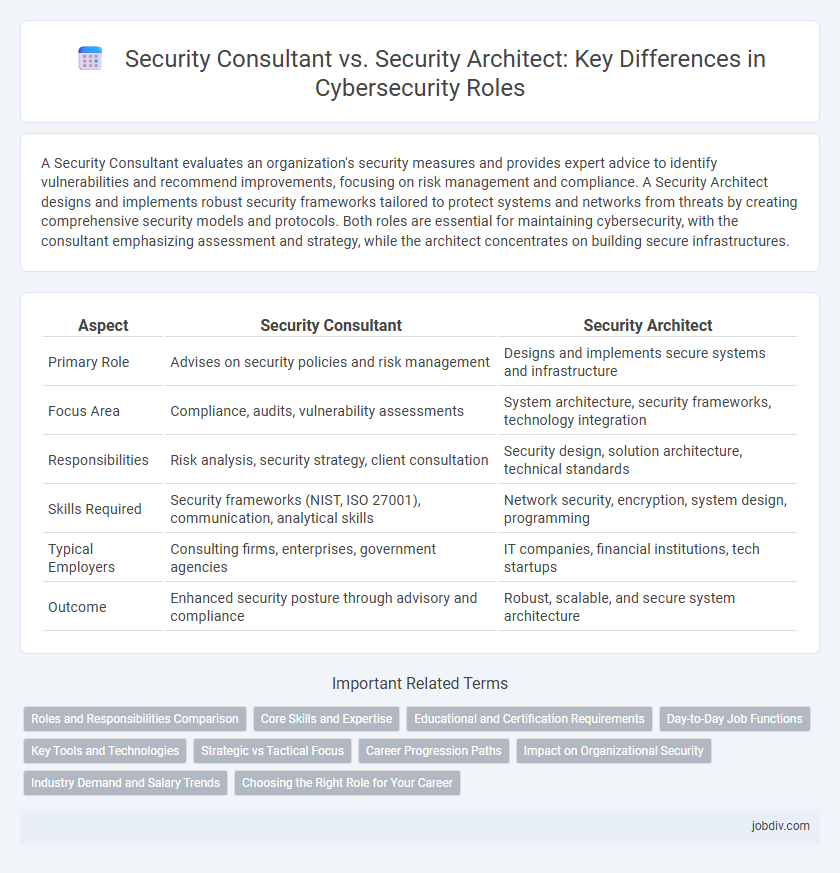A Security Consultant evaluates an organization's security measures and provides expert advice to identify vulnerabilities and recommend improvements, focusing on risk management and compliance. A Security Architect designs and implements robust security frameworks tailored to protect systems and networks from threats by creating comprehensive security models and protocols. Both roles are essential for maintaining cybersecurity, with the consultant emphasizing assessment and strategy, while the architect concentrates on building secure infrastructures.
Table of Comparison
| Aspect | Security Consultant | Security Architect |
|---|---|---|
| Primary Role | Advises on security policies and risk management | Designs and implements secure systems and infrastructure |
| Focus Area | Compliance, audits, vulnerability assessments | System architecture, security frameworks, technology integration |
| Responsibilities | Risk analysis, security strategy, client consultation | Security design, solution architecture, technical standards |
| Skills Required | Security frameworks (NIST, ISO 27001), communication, analytical skills | Network security, encryption, system design, programming |
| Typical Employers | Consulting firms, enterprises, government agencies | IT companies, financial institutions, tech startups |
| Outcome | Enhanced security posture through advisory and compliance | Robust, scalable, and secure system architecture |
Roles and Responsibilities Comparison
Security Consultants assess organizational vulnerabilities and develop tailored risk management strategies to safeguard assets and ensure compliance with industry standards. Security Architects design and implement comprehensive security infrastructures, creating security frameworks and protocols that integrate advanced technologies to prevent breaches. While Consultants focus on evaluating and advising, Architects emphasize building and maintaining robust security systems aligned with business objectives.
Core Skills and Expertise
Security Consultants specialize in risk assessment, vulnerability analysis, and compliance management to provide strategic recommendations tailored to organizational security needs. Security Architects possess deep expertise in designing and implementing robust security frameworks, integrating systems, and establishing protocols to protect infrastructure from emerging cyber threats. Both roles require proficiency in network security, threat modeling, and incident response, but Security Architects emphasize architectural design while Security Consultants focus on advisory and audit functions.
Educational and Certification Requirements
Security Consultants typically require certifications such as CISSP or CISM alongside a bachelor's degree in computer science or cybersecurity, emphasizing risk assessment and compliance expertise. Security Architects often hold advanced certifications like CCSP, SABSA, or TOGAF, in addition to degrees focused on network architecture or information security, highlighting design and implementation skills. Both roles benefit from continuous education but diverge in specialization, with consultants focusing on strategic advisory and architects on technical infrastructure development.
Day-to-Day Job Functions
Security Consultants analyze organizational risks, conduct vulnerability assessments, and recommend tailored security solutions to enhance defenses. Security Architects design and implement comprehensive security frameworks, develop security policies, and oversee the integration of security technologies across enterprise systems. Both roles require continuous monitoring of emerging threats, but Consultants focus on advisory and strategy, while Architects concentrate on system design and deployment.
Key Tools and Technologies
Security Consultants leverage a variety of risk assessment tools, vulnerability scanners like Nessus, and compliance management platforms to identify and mitigate security threats effectively. Security Architects specialize in designing robust security frameworks using technologies such as firewalls, intrusion detection systems (IDS), encryption protocols, and cloud security solutions like AWS Security Hub. Both roles require proficiency in security information and event management (SIEM) systems, but Security Architects emphasize the integration of these tools into cohesive, scalable infrastructures.
Strategic vs Tactical Focus
Security Consultants primarily engage in tactical security measures by assessing vulnerabilities, implementing solutions, and responding to immediate threats, ensuring operational effectiveness. Security Architects focus strategically on designing and developing comprehensive security frameworks and policies that align with long-term organizational goals and risk management. The strategic vision of Security Architects complements the tactical execution led by Security Consultants, creating a robust cybersecurity posture.
Career Progression Paths
Security consultants typically start their careers with hands-on experience in risk assessment and compliance, advancing to advisory roles where they design strategic security policies. Security architects begin with technical expertise in system design and network security, progressing to roles focused on creating comprehensive security frameworks and infrastructure. Career progression for both roles often converges at senior leadership positions such as Chief Information Security Officer (CISO) or Security Director, where strategic oversight and interdisciplinary knowledge are crucial.
Impact on Organizational Security
Security Consultants identify vulnerabilities and recommend tailored strategies to mitigate risks, enhancing compliance and reducing potential breaches. Security Architects design and implement robust security frameworks and infrastructure, ensuring long-term protection against evolving threats. Together, their combined expertise significantly strengthens an organization's security posture by balancing risk assessment with strategic system design.
Industry Demand and Salary Trends
Security consultants command high demand across diverse industries for their expertise in assessing vulnerabilities and implementing tailored solutions, with average salaries ranging from $90,000 to $140,000 annually. Security architects, essential for designing robust security frameworks and infrastructure, typically earn higher median salaries between $120,000 and $160,000 due to their specialized skills and strategic role. Industry growth projections indicate increasing demand for both roles, with the cybersecurity market expected to expand at a compound annual growth rate (CAGR) of over 10%, driving competitive compensation and opportunities.
Choosing the Right Role for Your Career
Security consultants focus on assessing risks, developing policies, and advising organizations on security best practices to mitigate threats. Security architects design and implement robust security infrastructures, integrating technologies to protect systems against cyber attacks. Choosing between these roles depends on whether you prefer strategic advisory functions with broad organizational impact or technical design responsibilities emphasizing system architecture.
Security Consultant vs Security Architect Infographic

 jobdiv.com
jobdiv.com